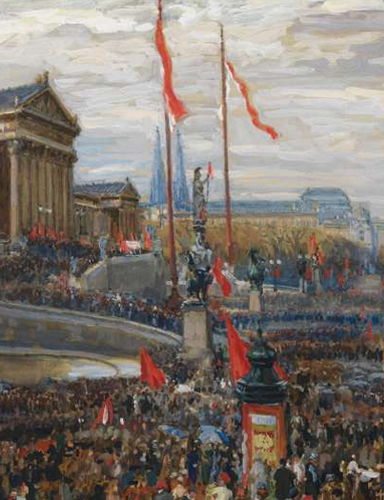Austro-Marxism is a corpus of the Marxist theory developed by the intellectuals closely connected to the multinational Social Democratic Workers’ Party of Austria. Labeled as the ‘little International’, in the last decades of the 19th century, it provided cultural and intellectual incubation space for the socialist movements in the Austro-Hungarian Empire and its successor states.
After the breakup of the Empire, Austro-Marxism inspired the practice of the Social democratic Workers Party of Austria, a mass party, which aimed at creating a socialist society by democratic mean. It became famous for its achievements in the municipality of ‘Red Vienna’. It distanced itself from both Marxist orthodoxy and Bolshevism, and later also, from the Third International dogmatism. Their most outstanding representative Otto Bauer clarified their position in the small book entitled Bolshevism or Social Democracy, as did Max Adler in his booklet Political and Social Democracy, where he positions himself close to Rosa Luxemburg’s writings.
In the successor states, Hungary, Czechoslovakia, Poland and Yugoslavia, independent socialist, social democratic and later Communist parties emerged, which however were still influenced by their common theoretical heritage. The cold war epoch contributed to a bipolar reception of Marxism as a Soviet orthodoxy versus a Western Marxism, referring to a great extent to Antonio Gramsci. The Central European version of Marxism fell into oblivion, especially after the demise of the so-called ‘realized socialism’.
In an editorial, written in 1926, for the Arbeiterzeitung, the newspaper of the Social Democratic Party, Otto Bauer gave his readers a short introduction to Austro-Marxism:
“In the second half of the 19th century, a group of young Austrian comrades working in academia started to go by the name ‘Austro-Marxists’, Max Adler, Karl Renner, Rudolf Hilferding, Gustav Eckstein, Otto Bauer, Friedrich Adler, and a few others.”
In these short lines, he mentions only men. However, remarkable women shaped the theoretical corpus of Austro-Marxism and contributed significantly to its intellectual sharpness and complexity. The works of Käthe Leichter, Therese Schlesinger, Adelheid Popp, Marie Jahoda, Hélène Bauer are still little known to an international academic audience.
Austro-Marxists were confronted with a wide array of challenges throughout the changing conjunctures of their time – like the ‘national question’ within a multi-ethnic Empire or the problems concerning the state’s role in the economy following the economic turmoil of the late twenties. They had to learn to apply the Marxist interpretation of history to complicated phenomena where a superficial application of Marxist methods was not permissible.
Austro-Marxism was internationalist from the outset. It constituted the common root and provided a common language to the Marxist tradition in Central and, to some extent, in Eastern and South-Eastern Europe. Inspired also by Kant and Mach, Austro-Marxism inspired others like Hans Kelsen, founder of the Pure Theory of Law, Alfred Adler, and Sigmund Freud.
Being hosted at the Austrian Universities, it contended with the Austrian School of Economics and its’ most remarkable theoreticians: Ludwig von Mises and Friedrich von Hayek. Their theories saw a glorious come-back to prominence during the neoliberal revolution of the 1980s. One would not go too far to say that Austrian School theories still build the backbone of global Neoliberalism. The debates between these two schools of thought during the twenties and the early thirties of the 20th-century concern issues highly relevant today.
The conference marks the release of the English translation of Otto Bauer’s book “The Austrian Revolution”, edited by Eric Canepa and Walter Baier.
Antal Attila: The Impact of Vienna Circle and Austro-Marxism on Hungary
Barbara Serloth: Käthe Leichter and the Austro-Marxist: The Dilemma of Womanhood and Intellectuality
Dunja Larise: Helene Bauer against Ludwig Mises on Marginal Utility Theory
Engelbert Stockhammer: Woytinsky, Hilferding and the Fiscal Orthodoxy of Interwar Social Democracy
Jean-Numa Ducange: Otto Bauer, Critique of Nationalism – Contestation of the Colonial Order
Michael Krätke: The Great Transformations of the Bourgeois State
Michael Krätke: The Other Austrian School
Petra Unger: „Where Have All the Women Gone?“
Stefan Gužvica: Sima Marković, The Austro-Marxist Who Wasn’t
Una Blagojević: The Ambiguities of the Austro-Marxist Legacy in Interwar and Postwar Yugoslavia
Walter Baier: Austro-Marxism and Democratic Socialism Today
Programme
Saturday, 29 Mai
State theory and Austro-Marxism Panel
9:30 – 10:00: Welcome and Introduction
10:00 – 10:30 The great transformations of the bourgeois state. A reminder of some unjustly forgotten innovations in the political theory of Marxism, Michael Krätke
10:30 – 10:45 Discussion
10:45 – 11:00 Coffee break
11:00 – 11:30 Otto Bauer, from the critique of nationalism to the contestation of the colonial order, Jean-Numa Ducange
11:30 – 11:45 Discussion
11:45 – 12:15 Austro-Marxism and Democratic Socialism Today, Walter Baier
12:15 – 12:30 Discussion
Austrian School and Austro-Marxism Panel
14:00 – 14:30 The Other Austrian School, Michael Krätke
14:30 – 14:45 Discussion
14:45 – 15:30 Helene Bauer against Ludwig Mises on Marginal Utility Theory, Dunja Larise
15:30 – 15:45 Discussion
15:45 – 16:00 Coffee break
16:00 – 16:30 Woytinsky, Hilferding and the fiscal orthodoxy of interwar social democracy, Engelbert Stockhammer
16:30 – 16:45 Discussion
Sunday, 30 Mai
Austro-Marxism and Eastern Europe Panel
10:00 – 10:30 Sima Marković, The Austro-Marxist Who Wasn’t, Stefan Gužvica
10:30 – 10:45 Discussion
10:45 – 11:00 Coffee break
11:00 – 11:30 The Heritage of “Neoliberal” Monarchy: The Impact of Vienna Circle and Austro-Marxism on Hungary, Antal Attila
11:30 – 11:45 Discussion
11:45 – 12:15 The Ambiguities of the Austro-Marxist Legacy in Interwar and Postwar Yugoslavia: Receptions, Adaptations, and the Contestation of Concepts, Una Blagojević
12:15 – 12:30 Discussion
Women in Austro-Marxism Panel
13:30 – 14:00 Marianne Pollak, Marion Löffler
14:00 – 14:15 Discussion
14:15 – 14:45 Where have all the women gone?, Petra Unger
14:45 – 15:00 Discussion
15:00 – 15:15 Coffee break
15:15 – 15:45 Käthe Leichter and the Austro-Marxist: The Dilemma of Womanhood and Intellectuality, Barbara Serloth
15:45 – 16:00 Discussion
16:00 End of conference
